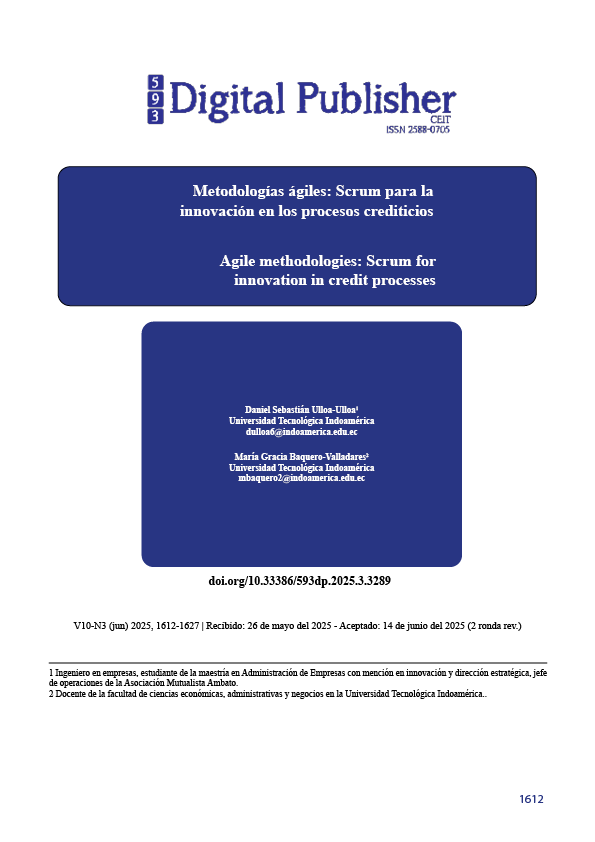Agile methodologies: Scrum for innovation in credit processes Agile methodologies: Scrum for innovation in credit processes
Main Article Content
Abstract
It is unknown how the agile Scrum method can be applied to certain economic activities, for example, during credit processes, and there is a complete absence of studies that record the influence of this methodology on the operations of financial institutions. In this context, this article aims to show the impact of implementing the Scrum method in credit processes to analyze its application benefits regarding operational management optimization. This identification addressed opportunities to innovate or improve credit granting by analyzing the agreement of experts regarding the relevance of a set of 24 innovation opportunities for credit granting processes. Then, an analysis of an experimental nature was created, from which a treatment group was formed, which included the projects where the Scrum methodology was applied, and a control group, that is, initiatives that were developed using traditional methods. After that, a Student's t-test was performed to determine the effect on operational management through analysis and inference of mean difference between the groups. From this analytical exercise it was determined that there is an effect derived from the application of the Scrum method in credit processes since significant improvements are observed in operational efficiency, reduction of approval times and increase in levels of customer satisfaction, which was the objective of the present investigation.
Downloads
Article Details

This work is licensed under a Creative Commons Attribution-NonCommercial-ShareAlike 4.0 International License.
1. Derechos de autor
Las obras que se publican en 593 Digital Publisher CEIT están sujetas a los siguientes términos:
1.1. 593 Digital Publisher CEIT, conserva los derechos patrimoniales (copyright) de las obras publicadas, favorece y permite la reutilización de las mismas bajo la licencia Licencia Creative Commons 4.0 de Reconocimiento-NoComercial-CompartirIgual 4.0, por lo cual se pueden copiar, usar, difundir, transmitir y exponer públicamente, siempre que:
1.1.a. Se cite la autoría y fuente original de su publicación (revista, editorial, URL).
1.1.b. No se usen para fines comerciales u onerosos.
1.1.c. Se mencione la existencia y especificaciones de esta licencia de uso.
References
Agarwal, D., Jeevan, J., Manikandan, R., Ramith, N., y Vandana, M. (2024). Advanced Automated Document Processing Using Optical Character Recognition (OCR). 2024 IEEE 9th International Conference for Convergence in Technology (I2CT), 1–5. https://doi.org/10.1109/I2CT61223.2024.10544263
Altamirano, M., Benítez, C., Toral, F., Jiménez, J., y Luis, J. (2023). Evaluación de la implementación de módulo de T.I. a Entidad de naturaleza Fintech. Caso de Uso: Sociedad Financiera Del Pacifico. LATAM Revista Latinoamericana de Ciencias Sociales y Humanidades, 4(5), 1155–1169. https://doi.org/10.56712/latam.v4i5.1384
Arief, R., Cicilia, E., Nur, I., Affan, R., Fariza, A., y Rante, H. (2024). Implementation of Scrum in the manufacture of non-invasive blood sugar detection devices using PPG signals. International Journal of Applied Sciences and Smart Technologies, 6(1), 137–160. https://doi.org/10.24071/ijasst.v6i1.7719
Ballesteros, L. (2021). Implementación y práctica de Scrum en la asignatura de formulación y evaluación de proyectos en la facultad de Ciencias Económicas y Administrativas de la Universidad El Bosque. Panorama, 15(29), 127–140. https://doi.org/10.15765/pnrm.v15i29.2538
Beeram, D., y Suganyadevi, K. (2024). Evaluating Credit Risk in Banking using AI-based Algorithm Optimization. 2024 15th International Conference on Computing Communication and Networking Technologies (ICCCNT), 1–6. https://doi.org/10.1109/ICCCNT61001.2024.10723944
Bhardwaj, A., y Mahida, A. (2024). Cultivating High-Performance Agile Teams. En Quantum Computing and Supply Chain Management: A New Era of Optimization (pp. 331–347). https://doi.org/10.4018/979-8-3693-4107-0.ch021
Bouzari, P., Gholampour, A., y Ebrahimi, P. (2020). The Interaction Between Human and Media in the Future of Banking Industry. En Contemporary Applications of Actor Network Theory (pp. 257–274). Springer Nature Singapore. https://doi.org/10.1007/978-981-15-7066-7_14
Castro, E., Castillo, J., Raymundo, C., Perez, M., y Dominguez, F. (2022). Digitization model for costs and operating times reduction in Peruvian Banks. Energy Reports, 8, 639–652. https://doi.org/10.1016/j.egyr.2022.07.098
Chacha, F., Cordero, D., y Ramón, G. (2024). Desafíos y estrategias en la implementación de metodologías agiles en proyectos informáticos. Runas. Journal of Education and Culture, 5(10), 1–18. https://doi.org/10.46652/runas.v5i10.189
Ciancarini, P., Ergasheva, S., Farina, M., Mubarakshin, D., y Succi, G. (2023). Agile methodologies between software development and music production: An empirical study. Frontiers in Computer Science, 5, 1–13. https://doi.org/10.3389/fcomp.2023.1181041
Cornelio, W., Becerra, J., Meneses, B., y Rios, S. (2023). Calidad del servicio y la satisfacción de los clientes en la mype “Créditos Becerra”, Lima, 2022. Salud, Ciencia y Tecnologia - Serie de Conferencias, 2, 1–32. https://doi.org/10.56294/sctconf2023467
Costa, A., y Marques, J. (2024). A Proposal for an Adapted Scrum for Aeronautical Software Development. 2024 AIAA DATC/IEEE 43rd Digital Avionics Systems Conference (DASC), 1–9. https://doi.org/10.1109/DASC62030.2024.10749470
De La Cruz, S. (2024). Implementación de metodologías ágiles en proyectos tecnológicos educativos de nivel superior. LATAM Revista Latinoamericana de Ciencias Sociales y Humanidades, 5(5), 3942–3952. https://doi.org/10.56712/latam.v5i5.2902
dos Santos, L., L’Erario, A., Pagotto, T., Camilo, J., Oliveira, F., y Fabri, J. (2018). A scrum-based process to distributed projects in multidisciplinary teams. Proceedings of the 13th International Conference on Global Software Engineering, 133–134. https://doi.org/10.1145/3196369.3196380
Elmunsyah, H., Hidayat, W., Pujianto, U., Suswanto, H., y Atsal, M. (2024). Adapting the Scrum Framework for Agile Project Management: Case Study of a SISINTA Thesis Management Platform. 2024 Seventh International Conference on Vocational Education and Electrical Engineering (ICVEE), 222–227. https://doi.org/10.1109/ICVEE63912.2024.10823962
Feitó, M., Cespón, R., Martínez, G., y Covas, D. (2015). Diagnóstico ecológico y económico de la cadena de suministros para el reciclaje de plásticos en el contexto empresarial cubano. Estudios Gerenciales, 31(136), 347–358. https://doi.org/10.1016/j.estger.2015.03.005
Fernández, Y., Gutiérrez, M., y Palomo, R. (2019). ¿Cómo percibe la banca cooperativa el impacto de la transformación digital? CIRIEC-España, revista de economía pública, social y cooperativa, 95, 11–38. https://doi.org/10.7203/CIRIEC-E.95.12724
Flores, F., Sanhueza, V., Valdés, H., y Reyes, L. (2021). Metodologías ágiles: un análisis de los desafíos organizacionales para su implementación. Revista Científica, 43(1), 38–49. https://doi.org/10.14483/23448350.18332
Hassan, A., Marchante, J., y Barceló, F. (2024). Scrum methodology for learning: Application on refrigeration course. Avances en Ciencias y Técnicas del Frío - 12. Actas del XII Congreso Ibérico y X Congreso Iberoamericano de Ciencias y Técnicas del Frío CYTEF 2024, 1–6. https://doi.org/10.21134/n4srvs88
Hernandez, L. (2022). El enfoque ágil como marco de trabajo en la producción académica. Revista Internacional de Tecnología, Ciencia y Sociedad, 11(2), 1–16. https://dialnet.unirioja.es/servlet/articulo?codigo=8736090
Hernández, R., Fernández, C., y Baptista, M. (2014). Metodología de la investgigación (6ta ed.). McGraw--Hill.
Jain, J., y Gupta, M. (2024). Leveraging Generative AI and OCR for Automating Loan Document Processing in Fintech. International Journal of Global Innovations and Solutions (IJGIS), 1–32. https://doi.org/10.21428/e90189c8.1436e7da
Janthongmuang, P., Kungcharoen, K., y Premchaiswadi, W. (2023). Enhancing Organizational Efficiency and Effectiveness: A Process Mining Approach. 2023 21st International Conference on ICT and Knowledge Engineering (ICT&KE), 1–8. https://doi.org/10.1109/ICTKE58576.2023.10401447
Kargas, A., y Aretos, A. (2023). Transforming Strategic Management Using Agile Methodologies. En New Perspectives and Possibilities in Strategic Management in the 21st Century: Between Tradition and Modernity (pp. 349–368). https://doi.org/10.4018/978-1-6684-9261-1.ch018
Kate, V., Bhalerao, S., y Sharma, V. (2023). Exploring Agile Methodologies in Educational Software Development- A Comparative Analysis and Project Management Insights. 2023 IEEE International Conference on ICT in Business Industry & Government (ICTBIG), 1–11. https://doi.org/10.1109/ICTBIG59752.2023.10456214
Lei, B. (2025). Research on the Impact of Digital Transformation on Enterprise Operational Efficiency. Frontiers in Business, Economics and Management, 18(1), 95–97. https://doi.org/10.27409/d.cnki.gxbnu
Lévy, J., Bourgault, N., Calvo, C., y Trudel, M. (2020). La influencia de la confianza y satisfacción del cliente en la intención de uso de los servicios bancarios por internet: Un modelo estructural. Ciencia ergo-sum, 27(2), 1–22. https://pdfs.semanticscholar.org/9001/cb3dbb39be77bca62b1ae7625b115f07f1cf.pdf?_gl=1*1ot5r3t*_gcl_au*MTY2MDkyMDU4My4xNzMyNTczNDUy*_ga*MTE2ODY0ODc4NC4xNzMyNTczNDUy*_ga_H7P4ZT52H5*MTczOTk4MjY0Ni4yNy4wLjE3Mzk5ODI4OTEuNTkuMC4w
Mahmuzic, N., y Andelfinger, U. (2023). Empirische Analyse zur Relevanz der Zertifizierungskurse „Product Owner“ und „Scrum Master“ und Ableitung einer ergänzenden On-the-Job-Qualifizierung. HMD Praxis der Wirtschaftsinformatik, 60(4), 940–954. https://doi.org/10.1365/s40702-022-00910-8
Modiha, P. (2024). Digital Transformation in the Finance and Banking Sector. En Digital Transformation in South Africa (pp. 95–117). https://doi.org/10.1007/978-3-031-52403-5_8
Moorthy, K., Mohd, K., Arokiasamy, S., y Tomal, M. (2024). Hybrid biometric authentication for automatic teller machine. International Journal of Software Engineering and Computer Systems, 10(1), 32–39. https://doi.org/10.15282/ijsecs.10.1.2024.3.0121
Mujinga, M. (2020). Online Banking Service Quality: A South African E-S-QUAL Analysis. En Responsible Design, Implementation and Use of Information and Communication Technology (pp. 228–238). https://doi.org/10.1007/978-3-030-44999-5_19
Muñoz, I., Collazos, C., y Hurtado, J. (2024). Desafíos de colaboración en la adopción de Scrum: un estudio en equipos de desarrollo de software del departamento del Cauca, Colombia. TecnoLógicas, 27(59), 1–17. https://doi.org/10.22430/22565337.2881
Naranjo, P., y Arias, I. (2022). Costos de innovación tecnológica en las cooperativas de ahorro y crédito, segmento 1, cantón Píllaro, periodo 2020. AlfaPublicaciones, 4(3.1), 482–515. https://doi.org/10.33262/ap.v4i3.1.275
Nuñez, X. (2022). Gestión de la cadena de suministro de la línea de producción de botas industriales en la empresa Plasticaucho Industrial S.A. [Tesis de grado, Universidad Técnica de Ambato]. https://repositorio.uta.edu.ec/server/api/core/bitstreams/0fc27368-970b-4282-9ba1-426a8156447e/content
Rahman, A. (2024). Agile project management: Analyzing the effectiveness of agile methodologies in it projects compared to traditional approaches. Academic Journal on Business Administrarion, innovation & Sustainability, 4(04), 53–69. https://doi.org/10.69593/ajbais.v4i04.127
Recalde, M., Soledispa, M., Merizalde, D., Muñoz, S., y Ortega, Y. (2024). Innovación y competitividad: el papel de la administración en la creación de ventajas competitivas sostenibles. South Florida Journal of Development, 5(7), 1–16. https://doi.org/10.46932/sfjdv5n7-032
Robinson, J., Rajakumari, K., y Hemalatha, D. (2024). To Survive in a Fast-Changing Business Landscape in the Age of Digital Transformation Organizations Must Be Flexible and Adaptive. En Practical Approaches to Agile Project Management (pp. 289–304). https://doi.org/10.4018/979-8-3693-3318-1.ch016
Romero, M., y Alban, F. (2020). Implementación de metodología ágil en la gestión de proyectos de una entidad financiera en Ecuador. 2–19. http://repositorio.uees.edu.ec/bitstream/123456789/3203/1/Paper_Monica%20Romero.pdf
Ruiz, A., y Guzmán, Y. (2024). Modelos de Elicitación de Requisitos Basados en Metodologías Ágiles: Una revisión sistemática de la literatura. Ciencia Latina Revista Científica Multidisciplinar, 7(6), 7691–7712. https://doi.org/10.37811/cl_rcm.v7i6.9303
Sathyanarayana, S. (2024). The Unified Lending Interface - Innovations in Lending: Conceptual Insights into the Future of Financial Services. International Journal of Business and Management Invention, 13(9), 35–48. https://doi.org/10.35629/8028-13093548
Serrano, E., y Castellanos, H. (2019). Estudio comparativo de herramientas software libre para la Gestión de Procesos de Negocio. Revista EIA, 16(31), 171–187. https://doi.org/10.24050/reia.v16i31.1148
Sun, J. (2024). Research on risk detection and management based on machine learning. Applied and Computational Engineering, 92(1), 142–146. https://doi.org/10.54254/2755-2721/92/20241678
Tadeo, F. E., y Coral, M. A. (2023). Modelos para la evaluación de riego crediticio en el ámbito de la tecnología financiera: Una revisión. TecnoLógicas, 26(58), 1–20. https://doi.org/10.22430/22565337.2679
Williams, M. (2023). Any Financial Institutions Doing Scrum and/or Agile? https://www.scrum.org/forum/scrum-forum/74844/any-financial-institutions-doing-scrum-andor-agile
Yaguana, P., Haz, Y. P., Sandoval, N., y Tamayo, A. (2020). Los procesos de crédito y su impacto en las instituciones financieras. Pro Sciences: Revista de Producción, Ciencias e Investigación, 4(36), 76–85. https://doi.org/10.29018/issn.2588-1000vol4iss36.2020pp76-85
Zanfelicce, R., Costa, M., Romerio, A., Penha, R., y Ferreira, L. (2022). The use of agile practices in innovation projects: A systematic review of the literature. Revista Brasileira de Gestão e Inovação, 124–148. https://doi.org/10.18226/23190639.v9n3.06



